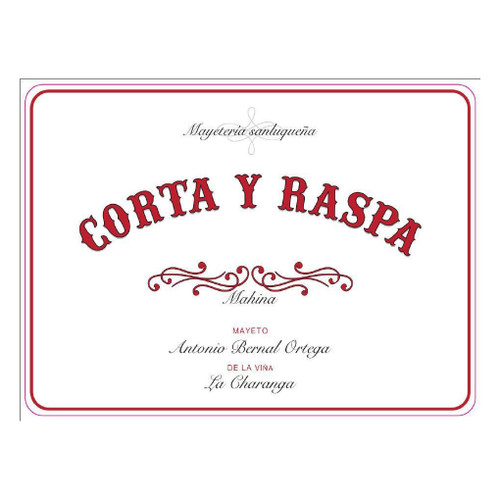Mayeteria Sanluqueña is a project begun in 2017 by one of the bright and kind souls revitalizing wine production in Sanlúcar, enologist Ramiro Ibáñez. It puts the spotlight on mayetos, small family producers that are working their own vineyards around Sanlúcar, and usually selling their grapes to large wine houses or cooperatives. Up till the 1980s over 100 of them co-existed with much larger vintners in Sanlúcar but many of them disappeared in the 1990s due to legal requirements and lowering profits. Now there are less than 20, who often have other jobs on the side to make ends meet. All of the wines go under the label of "Corta y Raspa" - a traditional term for winemaking in this region, and the growers are listed underneath to distinguish the individual bottles.
All the wines in the series are made in exactly the same way. This wine is made by Antonio Bernal, the oldest of the three mayetos, and belongs to a family who has been working in Pago Mahina, to the west of Sanlúcar, for four generations. His father was the foreman of most of the vines in this inland vineyard that produces wines with sapidity and power. His 30-year-old vines of Palomino Fino are planted on highly-valued "Albariza de Barajuela" soils, which resemble a pack of cards. Incredibly layered upon each other.
"La Charanga" is Antonio’s wine, focusing on minimal intervention and low yields that would be unsustainable if he would be selling the grapes off to regular coops. The grapes are hand harvested, wine is fermented in neutral barrel, without fortification and very little development of flor, though some does develop naturally for around a year. Wines are bottled unfined, unfiltered, and with low to no SO2. Production is under 2,000 bottles.
All the wines in the series are made in exactly the same way. This wine is made by Antonio Bernal, the oldest of the three mayetos, and belongs to a family who has been working in Pago Mahina, to the west of Sanlúcar, for four generations. His father was the foreman of most of the vines in this inland vineyard that produces wines with sapidity and power. His 30-year-old vines of Palomino Fino are planted on highly-valued "Albariza de Barajuela" soils, which resemble a pack of cards. Incredibly layered upon each other.
"La Charanga" is Antonio’s wine, focusing on minimal intervention and low yields that would be unsustainable if he would be selling the grapes off to regular coops. The grapes are hand harvested, wine is fermented in neutral barrel, without fortification and very little development of flor, though some does develop naturally for around a year. Wines are bottled unfined, unfiltered, and with low to no SO2. Production is under 2,000 bottles.






